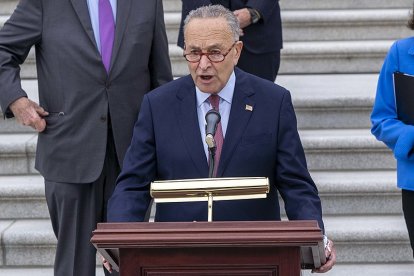Debt ceiling deal reaches Senate, where Chuck Schumer hopes to pass it despite some opposition
Both Democrats and Republicans have complaints and demands about the legislation, so it is expected to be a long day of debate and voting on Capitol Hill.

Chuck Schumer/Wikimedia Commons
The House passed the Joe Biden-Kevin McCarthy debt ceiling deal on Wednesday night. With 165 Democrats and 149 Republicans voting in favor, the bill advanced to the Senate, where it will be debated and voted on this Thursday. Despite everything being on track, it appears that the Senate will not be able to pass the legislation without some last minute drama.
Chuck Schumer (D-N.Y.) is hearing conditions from both sides of the aisle, though he's very clear on what he's going to do. Regardless of the intentions of one or the other, he plans to get the deal approved any way he can and let the session last as long as it must.
"The Senate will stay in session until we send the bill avoiding default to President Biden’s desk. We will keep working until the job is done. Time is a luxury the Senate does not have if we want to prevent default", he said.
Republicans call for extra defense funding, Democrats take aim at Mountain Valley pipeline
Between amendments, the Republican opposition's claim is clear: they seek to mitigate the effects of the agreement on defense. Specifically, as reported by Politico, they will ask the majority leader for a separate bill that would add more investment in this area, particularly to further support Ukraine in its war against Russia.
The problem for this group, composed of Lindsey Graham (R-S.C.), Mike Rounds (R-S.D.), Tom Cotton (R-Ark.), Susan Collins (R-Mass.) and Dan Sullivan (R-Alaska), is that the current agreement would cap defense spending at up to $900 billion for the next two years.
"Not a penny in this bill to help Ukraine defeat Putin!" Graham exclaimed. Cotton indicated that the legislation, "This bill poses a mortal risk to our national security by cutting our defense budget, which I cannot support as grave dangers gather on the horizon".
Dissatisfaction with the bill is not exclusive to Republicans. Ed Markey (D-Miss.), Bernie Sanders (I-Vt.) and Tim Kaine (D-Va.) spoke out against it for different reasons. Sanders was highly critical of many facets of the deal and has already stated that he "cannot" vote in favor.
Kaine, who was Hillary Clinton's running mate in 2016, is wary of something Joe Manchin (D-W.Va.) helped get into the deal, the Mountain Valley Pipeline. The agreement authorizes the completion of the project, which will transport over 14 billion gallons of natural gas. The deal also establishes a time limit of two years for the most rigorous type of environmental review, when the average time for this type of check is four and a half years.
Kaine has already introduced a formal amendment to remove the pipeline from the agreement. "I’m introducing this amendment to strip this harmful provision—which is completely unrelated to the debt limit—from the bill because I owe it to the Virginians impacted by the pipeline—including the hundreds of Virginians whose land is being taken away—to ensure the project only proceeds following fair administrative and judicial review", he said.
Returning to the GOP, Ted Cruz (R-Texas), Rand Paul (R-Ky.), Mike Lee (R-Utah) and Tim Scott (R-S.C.) were also critical of the deal. Within this group, the most vocal critic was the Kentucky native, who tweeted, " Fake conservatives agree to fake spending cuts. Deal will increase mandatory spending ~5%, increase military spending ~3%, and maintain current non-military discretionary spending at post-COVID levels. No real cuts to see here. Conservatives have been sold out once again!".
RECOMMENDATION





















